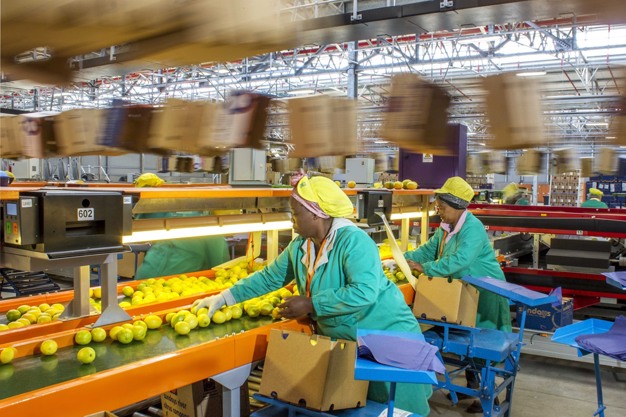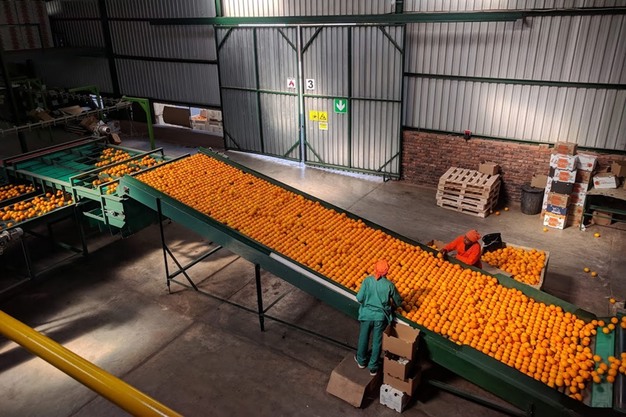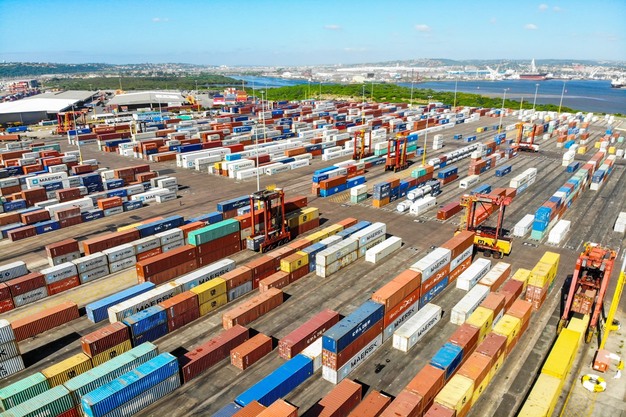Next year is an election year in South Africa and the minimum wage is under its annual review. The state is proposing the consumer price index (CPI) plus 3% (effectively 9% in toto) while the business lobby would prefer a minimum wage increase equalling the CPI (5.5% in November).
The minimum wage is currently R25.42 (1.27 euro) per hour; since 2021 it has incrementally increased by R5 (0.25 euro). The official unemployment rate is 32.6%, and while general food inflation is 9%, it is 11.5% on fruit.
“Looking after the poorest of the poor – no-one could have any objections to that,” remarks Hannes de Waal, chairperson of the Citrus Growers’ Association (CGA) and chief executive of the Sundays River Citrus Company in the eponymous valley where 122 farmers grow citrus, sole economic driver for the area.
In itself the wage increase is not the biggest issue in the life of fruit farmers, he says – incentives can, and often do lift the income of high-performing employees to double the minimum wage.
“In all aspects our aim is to reward high productivity,” agrees Jan-Louis Pretorius, CGA director in Letsitele. However, Pretorius adds, the multiple increases to the minimum wage level were not sustainable.
“As it is employment opportunities are being shed while rural communities can least afford it.”

On stock and grain farmers, as well as on small-scale growers, it will be a heavier burden. The upward pressure exerted by a minimum wage increase means inflation rates won’t be coming down.
Already, De Waal says, every year their fortunes depend on externalities: in 2023, they were “very fortunate” that their citrus yield was lower, that Spain had drought and that the Rand weakened.
“If the crops from Spain and South America were normal, we’d have had a lot of problems. Every time we need to be lucky just to keep head above water. Structurally there is a very big problem. You can’t be relying on luck: at the moment a poor crop in Spain and the exchange rate are what’s keeping the citrus industry going.”
Fruit, the last remaining non-automated industry
The citrus community understands the socio-economics of their area: for years now Sundays River Valley citrus growers have been financing municipal services such as water delivery and road repair in Kirkwood, in full and amicable cooperation with the town authorities.
When dirt roads aren’t annually scraped, levels of thrips and oleo on lemons soar.
It is voluntarily funded by 32c per export carton and it even extends to providing transport for youth to sport events.
“Fruit is your last non-automated industry left in the country. Mining has automated, the automotive industry has long since automated. It’s just fruit. We could automate 90% of the functions in our packhouses and then 22,000 people are left without work in the Valley.”
Therefore producers in the Valley – no strangers to labour action, fomented from outside they maintain – took the deliberate collective decision not to automate their fruit packhouses.

The Eastern Cape's automotive industries are also major users of the ports and equally hamstrung.
De Waal is upset by the decision to close the Volkswagen factory in Uitenhage early this year, a move demonstrably linked to port operations.
Farm resilience swiftly eroding
“I want to sketch the picture of South African farmers for government: 25% of citrus farms are one catastrophe away from bankruptcy.”
These farms’ ability to remain viable is being tested by the millions spent on diesel for electricity generators, or forms of alternative energy. The state-owned electricity grid can no longer be relied upon. Consequently, citrus growers could not adequately irrigate and the yield dropped.
On one of their farms, they are investigating alternative energy and when paid off over five years, he has calculated it will take a bite of R2 from the profit on each carton.
“Letsitele [Valencia orange and grapefruit production region in Limpopo Province] has now had eleven days of record heat. They cannot grow citrus without irrigation. Every farmer is being forced to look for alternative energy and if you don’t do it, you will go bankrupt.”
The second reason for a lower yield, he says, was that many farmers had cut on their inputs to relieve the financial pressure they’re under. Fertiliser and chemical prices have stabilised, but still not back at 2019 levels.
He regards shipping rates as the wild card. Dry bulk cargo rates have come down, but reefer rates have not followed suit. The level of service provided by South African state port operators to shipping lines create a high tariff climate.
An efficient port terminal is quasi-military in its discipline
In the 1990s De Waal was the operations manager of Durban Container Terminal and later terminal manager of the Fresh Produce Terminals at the same port. He remembers the strict discipline that governed operations, the regularity of routine maintenance, the level of hands-on experience among board members.
South African port and railway engineers were the best in the world, he says. As the institutional character of Transnet changed, a brain drain hugely benefitted railway companies and ports elsewhere in the world.
“Transnet has experienced total system collapse, in my personal opinion. The government has to recognise this and bring in experienced utilities management from abroad.”
 Hannes de Waal was operations manager of the Durban Container Terminal
Hannes de Waal was operations manager of the Durban Container Terminal
Maersk’s recent announcement to move transshipments to Port Louis, Mauritius, is a slap in South Africa’s face – one that ought to serve as a wake-up call.
“With all of these problems we are the frog in warm water. We’re living on hope and hope is no strategy. It poses a big danger to the growth target that the citrus and the fruit industry set for itself and that growth target is very important to South Africa’s economy. We can’t carry the load alone anymore.”
